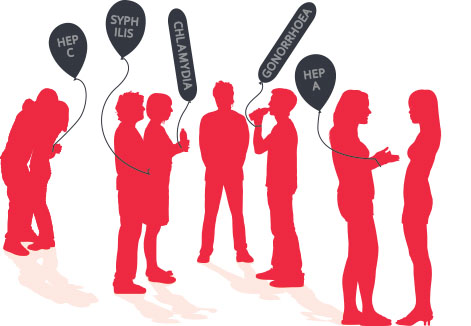
STI’s & BBV’s
The instance of chlamydia, a potentially serious infection that can cause infertility, has doubled in the past 10 years.
The fifth National Survey of Australian Secondary Students and Sexual Health 2013* found only 2.2 per cent of young men and 2.7 per cent of young women had been diagnosed with an STI (Sexually Transmissable infection).
Most (88.5 per cent) knew they could have an STI without displaying obvious symptoms. But fewer knew that chlamydia affects both men and women (60 per cent), can lead to sterility among women (56 per cent), and once a person has genital herpes they will always have the virus (46 per cent).
Two-thirds of students correctly identified the risk of hepatitis C posed by injecting drug use (66 per cent) and that hepatitis C can be transmitted by tattooing and body piercing (64 per cent).
Asked about STI symptoms, most students correctly identified pain or discomfort when urinating (86 per cent), a rash in the genital area (84 per cent), lumps and bumps in the genital area (84 per cent), discoloured skin in the genital area (78 per cent), and “discharge from the penis or vagina” (75 per cent). Fewer knew that “muscular soreness in the thighs” (33 per cent) and “severe headache” (27 per cent) could be STI-related.
Knowledge of human papillomavirus, or HPV, was generally poor. Six in 10 female students (63 per cent) had heard of HPV, compared with 45 per cent of male students. Most (56 per cent) knew condoms did not provide complete protection against it.
But only 23 per cent knew the virus did not just affect, or mainly affect, women. Only 24 per cent knew it was associated with genital warts, 26 per cent knew the vaccine could be obtained free from a GP and just eight per cent knew it could cause cancers of the head and throat. Almost seven in 10 young women (68 per cent) knew about the HPV vaccine, but only 52 per cent had been vaccinated.
What are STIs and BBVs?
Sexually transmissible infections (STIs) and blood borne viruses (BBVs) can be passed on by sexual contact. This includes vaginal, oral and anal sex, as well as genital touching and skin-to-skin contact. Some STIs and BBVs can be passed from a mother to her child during pregnancy or childbirth.
It’s impossible to tell if a potential partner is infected just by looking at them as most people with an STI or BBV have no obvious symptoms. The best protection is safer sex, which means always using condoms or dams during anal, vaginal or oral sex. Regular sexual health checks are also important.
Protecting yourself from STIs and BBVs
- Always use condoms or dams when you have vaginal, anal or oral sex and if you need more lubrication, make sure it’s water based.
- Make sure semen, blood and vaginal and anal fluid are not passed between partners.
- Talk about sex with your partner/s (i.e. what you want and don’t want to do).
- Always use clean needles and never share drug-injecting equipment.
- If you see sores, lumps or ulcers around the mouth or genital area or any unusual discharge, avoid vaginal, anal and oral sex and any activity involving skin-to-skin contact with the affected area.
Chlamydia
Chlamydia is Australia’s most frequently reported STI, and the number of new diagnoses has more than doubled in the past 10 years. It is often symptomless and can cause infertility if left untreated.
The infection is caused by bacteria and affects men and women. Family Planning Victoria urges those under 30 who have had sex, to be checked annually.
In women, it might cause an increase in vaginal discharge, unusual bleeding, pain during sex a burning feeling when urinating or pain in the lower abdomen. In men, it might cause a discharge from the penis or a burning feeling when urinating.
If women aren’t treated, chlamydia can cause pelvic inflammatory disease (PID), which can lower the ability to have a baby (fertility). It’s easily diagnosed with a urine test and treated with antibiotics. Sexual partner/s also need to be treated as soon as possible.
The HIV, viral hepatitis and sexually transmissible infections in Australia. Annual Surveillance Report 2015 (University of NSW/Kirby Institute) found the number of new chlamydia diagnoses more than doubled nationally from 2005-2014 from 40,601 to 86,136.
Female cases jumped from 24,062 to 49,307 and male from 16,457 to 36,790. The over-40 age group had the biggest increase, from 2381 to 6421. In Victoria, the number increased from 8877 to 19,922.
In 2014, there were 86,136 chlamydia notifications nationally. Of those, 57 per cent were in females, 78 per cent were in people aged 15-29 and 68 per cent lived in major cities. In the 15-19 age group the female‑to‑male sex ratio was 3:1, but it fell to 1:1 at 25-29.
For more information visit // www.fpv.org.au or www.fpv.org.au/assets/Chlamydia.pdf
Genital herpes
Genital herpes is caused by the herpes virus and spreads through vaginal, anal and oral sex or by genital skin-to-skin contact. It can be symptom-free or can emerge at any time, including some time after infection. Herpes usually appears as small, painful genital blisters which turn into shallow ulcers that scab over and heal up. It can also appear on the buttocks or thighs.
Herpes is diagnosed by a swab test and, while it can’t be cured, symptoms can be treated with antiviral tablets, but the virus stays in the body for life. Infection risk is greatest when sores are present, but you can transmit it while symptom free. Symptoms can return after treatment.
Gonorrhoea
Gonorrhoea is caused by a type of bacteria. In women, it can cause an increase in vaginal discharge, unusual bleeding, pain during sex, a burning feeling when urinating or pain in the lower abdomen. In men, it can cause a discharge from the penis or a burning feeling when urinating.
It can be symptomless. It is diagnosed by a urine or swab test and is treated with antibiotics. If untreated, women can develop pelvic inflammatory disease (PID), which can lower the ability to have a baby (fertility).
Vaginal discharge, including Candida (thrush)
Most women have a whitish or clear vaginal discharge during their cycle, which is normal. Discharge changes may mean an infection with signs such as an odour, yellowish or grey discharge, thickened appearance, itching or pain.
Hepatitis A
A viral infection that can affect the liver, hepatitis A is spread by small amounts of faeces from an infected person entering the mouth (e.g. licking the anal area or another part of the body which has had contact with the anal area, such as fingers). It can also be spread by contaminated food and water and is diagnosed by a blood test. There is no treatment; the body naturally clears itself of the virus. Vaccination is available.
Hepatitis B
Hepatitis B is a viral infection that can affect the liver. It’s spread by the exchange of body fluids (e.g. blood, semen, vaginal discharge, anal mucus) during unprotected sex and sharing needles. Diagnosed by blood test, most newly infected adults will clear the infection naturally. Treatments are available. A small percentage of carriers risk serious liver damage. Vaccination is available.
Hepatitis C
Hepatitis C is a viral infection that affects the liver and can cause serious damage. It’s not easily spread by sexual contact but by blood through activities such as sharing needles or being tattooed with used needles. Hepatitis C is diagnosed by a blood test. Some people will clear it from their body naturally, but treatment is available if that doesn’t happen. No vaccination is available.
Genital warts (HPV)
HPV (human papillomavirus) is spread by genital skin-to-skin contact and may not cause obvious symptoms. HPV can appear as lumps around the vulva or in the vagina, on the penis or around or inside the anus.
Genital warts can take months to appear. The warts can be removed by freezing or applying a special paint or cream. They can return, but the body eventually clears itself of the virus. Vaccination is available and free for school-aged women. Young men can access it from their doctor.
Syphilis
Syphilis is caused by bacteria and is more common in men who have sex with men. The first infection might cause a sore (ulcer) on the genitals. If untreated, syphilis, which is diagnosed by a blood test, can cause other symptoms such as a skin rash, patchy loss of hair and generally feeling unwell.
It is treated with antibiotics, and this should start as soon as possible, as it can cause serious health problems. Sexual partners should also be treated as soon as possible.



